SPPA Conference 2017
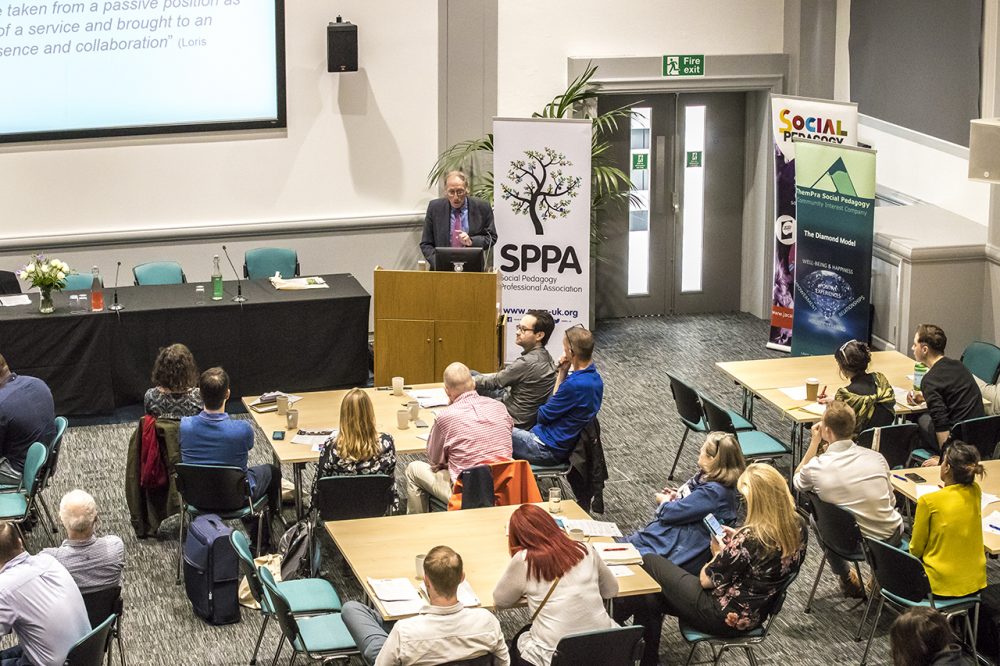
Social Pedagogy Professional Association Conference 2017, 6th October, Woburn House London
The Social Pedagogy Professional Association’s inaugural Conference took place on Friday 6th October 2017 at Woburn House in London. It was a day filled with a series of workshops, networking and a chance for new members and non-members to get together and engage in how social pedagogy can be more prominent in the UK with members and non-members support, and how SPPA can help support that.
It was attended by 75 members and non-members alike, from different sectors around the UK, all intrigued by making connections with social pedagogy and charting a way forward for social pedagogically informed policy and practice in the UK. It was also an opportunity to reflect on the growth of SPPA since the launch in February 2017 and how much it has developed not only as a membership organisation but in also supporting the piloting of the Level 3 and 5 Diploma qualifications, as well as promoting interest and demand for social pedagogy in the UK to provide better care to children, young people, adults and older people across all sectors.
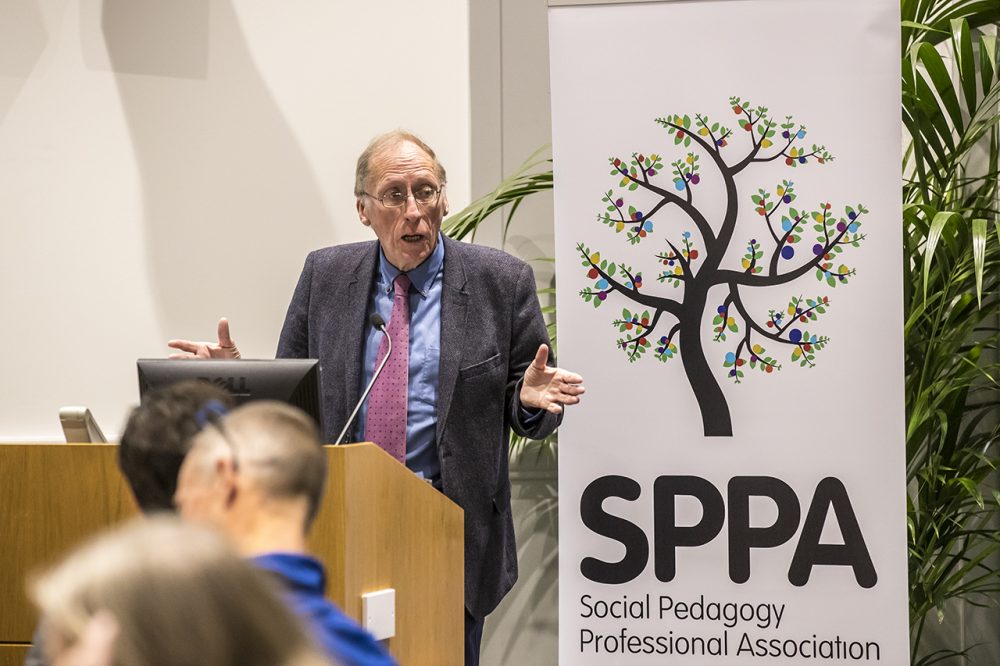
Professor Peter Moss – Social Pedagogy Professional Association Conference 2017, 6th October, Woburn House London
Social Pedagogy and school-based education – distant relatives or close family?
Professor Peter Moss started the day, by delivering a keynote talk on how ‘education in its broadest sense’ has much in common with the principles and practices of Social Pedagogy as understood by SPPA and expressed in our Charter. He talked about how school-based education (SBE) in England today is nearer the ‘education in its narrowest sense’ end of the continuum, as a distant relative of Social Pedagogy. Referencing the Reggio Emilia approach (in Northern Italy) and how municipal schools for young children that use experiential learning methods in relationship driven environments have benefited children and young people. He argued that we should be using the same example in the UK by using progressive education in which ‘school-based education’ is near to the ‘education in its broadest sense (EBS)’ end of the spectrum, as close family. He concluded by urging Social Pedagogy to provoke debate about the meaning of education and the image of the school.
SPPA Poster Competition
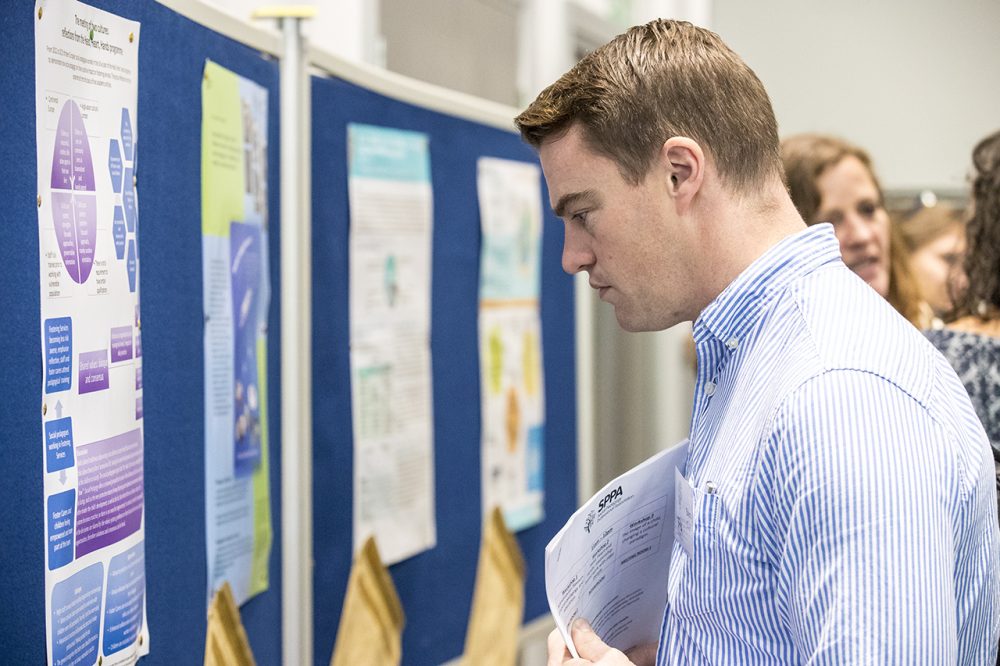
The SPPA Conference also saw a Poster Competition held, sponsored by the International Journal of Social Pedagogy and UCL Press based on the theme, ‘Education in its broadest sense‘. We had an excellent variety of submissions that were available to view by our attendees throughout the day and were able to provide input and comments on each poster displayed. The winner of the competition was later announced.
Submission were made by:
Cecile Remy, poster titled: ‘The image of the rich child in social pedagogy’
The poster will outline the methodology suggested to answer the following research question: “How the image of the rich child is influencing the work of social pedagogues?”. The poster will be a visual representation of the principle of ascending from the abstract to the concrete, used by Freire and Engestrom as a key principle to their definition of learning.
Maria Fátima Barros Correia, poster titled: ‘Social Pedagogy as the foundation of a new socio-educational profession – Social Educator’
Social Education has recently emerged as a profession in Portugal. This work intends to describe the role these professionals play in developing society and how it finds its theoretical framework in Social Pedagogy. Social Education is a social work imbued with a pedagogical character (educational dimension in society) and educational work carried out in the context of social action (socializing dimension of education). Social pedagogy is the “science of social education” because it is a field of knowledge that integrates, in an interdisciplinary way, different knowledge and produces methodological and theoretical models oriented to a reflection of social and cultural problems. Education constitutes a tool of social participation and socio-educational action and, consequently, of community development. Thus, Social Pedagogy seeks to respond to the potential of society as a factor of social development.
Patricia Walls, poster titled: ‘Culture, connections and curation for the curious – creativity and challenge!’
To better connect ethos, learning and practice we constantly ask ourselves ‘Why do we do what we do?’ and ‘How can we do it better?’ We offer a variety of platforms to access to inspire curiosity, including online courses, curation, academic modules, taught and experiential learning. We would like to share how social pedagogy can be the thread which connects our strength based learning and practice and how we value being connected to a wider network including ThemPra, SPDN, SPPA, Strathclyde university etc. to support us.
Simon Johr and Veronica Eva Perez, poster titled: ‘The meeting of two cultures: reflections from the Head, Heart, Hands programme’
From 2012 to 2015 social pedagogues from different parts of Europe worked in the United Kingdom as part of the Head, Heart, Hands programme (HHH). The programme aimed to demonstrate how introducing social pedagogy into foster care could have a positive impact on fostering services. At the end of the programme the thirteen social pedagogues reflected on their experience. The group decided to capture their learnings in writing for a wider audience, with the aim of identifying areas of improvement and reinforcing current practices for enhancing the quality of care in the UK, and ultimately to contribute to the understanding of how social pedagogy could be integrated within the social care field in the British context. The results of this effort are two academic papers each looking at different aspects of the programme and its background.
Congratulations to our winner, Patricia Walls from Kibble! Her poster on ‘Culture, connections and curation for the curious – creativity and challenge!’ won her £100 worth of gift vouchers.
However none of our participants left empty handed! All received gift vouchers for the hard work they contributed towards their posters. Thanks to our sponsors, and to all those who took part.
You can view the descriptions and posters under the publications page here
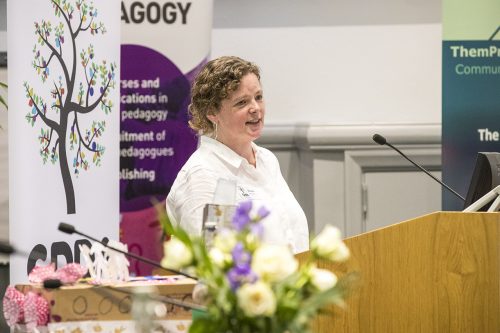
Social Pedagogy – where do we go from here?
To end the day, Nicola Boyce gave a rousing keynote, highlighting the future direction of social pedagogy. She highlighted that social pedagogy in the UK has come a long way in the last 15 years, from interest in small academic circles to development in practice in scores of organisations working with children and adults, as well as the development of professional qualifications from vocational diplomas to post-graduate degrees. Nicola stated that much of this development has been dependent on pilot projects, including the ‘Head, Heart, and Hands’ fostering programme, and the inaugural SPPA conference. Where we go from here depends on how we continue to value and hold in creative tension the different aspects of social pedagogy, as a theoretical paradigm, as practice, as a professional education, an area of policy and research with its own unique orientation to the world, including critical political and cultural dimensions. To do this, we must individually and collectively empower ourselves to develop social pedagogy in our own areas of practice and how we continue to come together and recognise what we share in common, while learning from the differences between us and inspiring others to join in.
We are pleased to announce that we will be hosting our next SPPA Conference in Edinburgh, Scotland on 28th September 2018!
We would like to thank everyone who attended and participated at the SPPA Conference in London. Below is a short video of the event, and a glimpse of what to expect for the next one:
Workshops and Special Interest Groups (SIGs)
We ran a number of workshops and Special Interest Groups (SIGs) at the conference, which were running in parallel with other sessions. Our attendees had the option to sign up for some workshops and SIGs that were of interest to them, from Social Pedagogy in Refugee Camps to Learning, Creativity and more!
Below, we have a brief overview of each workshop and SIG.
| ‘Only Milk and Honey?’: Scandinavian flavours of social pedagogy and education |
|
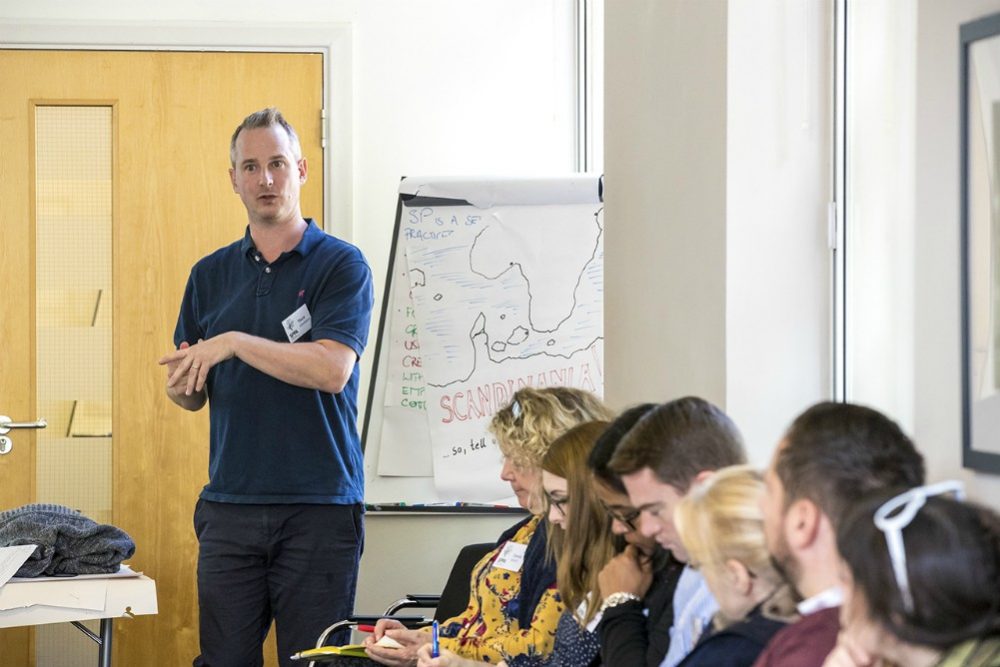
The workshop intended to offer some examples of practices and perceptions around social pedagogy in Sweden in Denmark. It covered:
- The social pedagogy qualification as it appears in Nordic countries.
- Variant within the region as far as the professional discipline goes.
- A myth-busting ‘what is it like being a social pedagogue over there’.
- A group discussion about ideal-vs reality.
- The creation of a Social Pedagogy Tree of ideas, hopes, aspirations, which will be used in future workshops.
Some key points: Social pedagogy may be a ‘model of society’ in some European countries to a greater extent than we see in the UK, but this does not remove the challenge for a critical pedagogue, but alters the task and mission. Workshop leaders’ hypothesis is that social pedagogy should never become ‘stale’ or exclusively ‘what we normally do’, it’s role is to challenge and further develop existing strengths, whether the profession is settled or emerging in a country.
What next? The workshop was extremely well-attended and productive, so the facilitators hope to find a suitable way of carrying forward the discussion on another occasion – to bring more continental and global perspectives around social pedagogy into the discussion.
| Head, Heart and Hands: relationship-based work with older people |
|
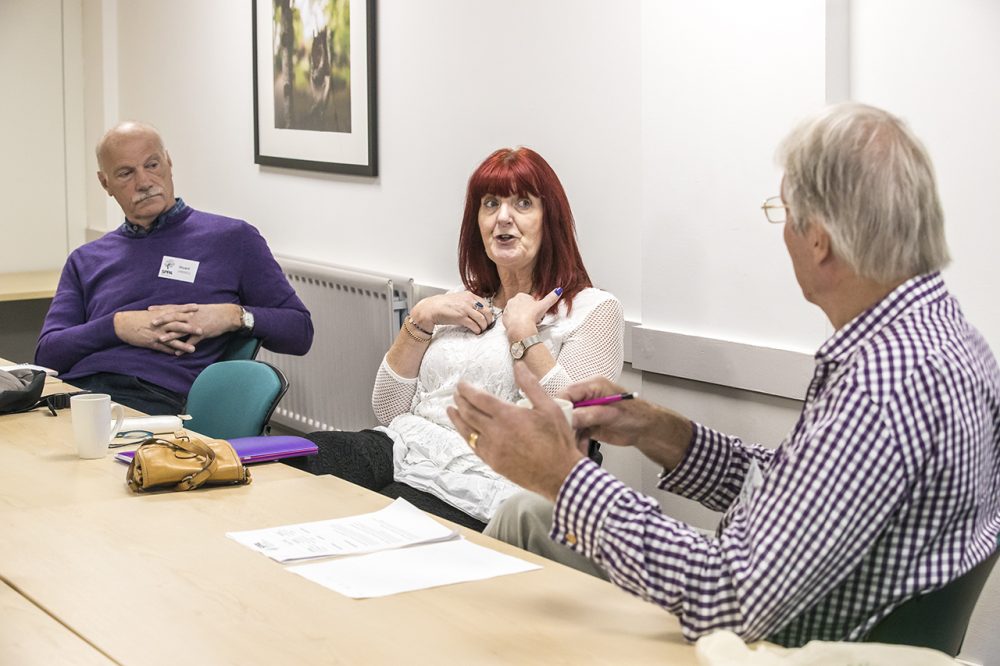
Rob Hunter, Pat Petrie and Thure Johansen have been working together to explore the feasibility of taking a Social Pedagogy approach to work with older people: in residential and domiciliary care, in housing associations and in community-based projects. The nine workshop participants shared their interest: from personal commitment brought on by experiences of finding appropriate care for their parents, through knowledge of intergenerational community hubs in Germany, to work in Derbyshire’s Adult Learning Service. Social pedagogy’s focus on relationships, on seeing the whole person – past, present and future – on wellbeing, learning and growth, the continued contribution of older people to community development and the focus on the personal development of the worker in a field currently atomised and with little professional identity, held promise. Future plans:
- developing examples of work for the Project Bank
- setting up a SIG
- seeking funding for a course in Leicestershire
| The image of a child: changing a cultural paradigm |
|
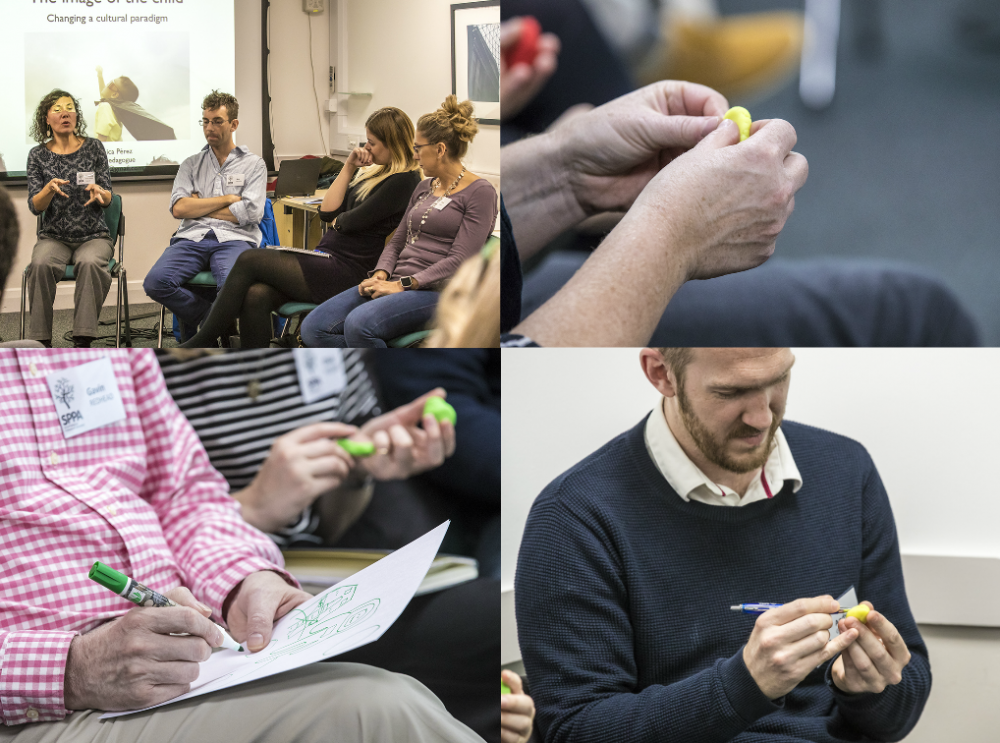
The workshop proposal was an invitation to explore the ‘Image of the child’ from the starting point of connecting with own cultural imaginary from childhood. Who did we admire? Who inspired us when we were little? Who was our fictional or real life hero? We took off in a creative journey of rediscovering our hero’s strengths and struggles, and in the way we found also our own.
We were able to translate this knowing into our practise when we see the child as resourceful, strong and able, no matter their circumstances. Then we can accompany children through their life journey in an empowering way. when we do that, they can see their strengths and own them.
| Special Interest Group: Learning |
|
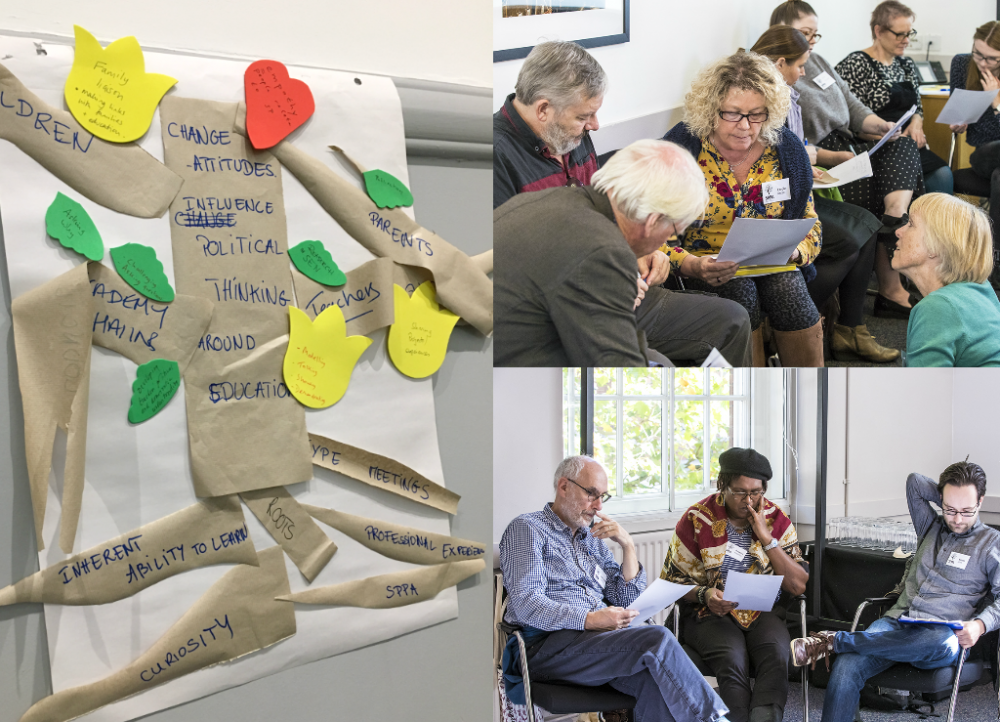
The meeting was attended by around 25 people, all with a professional interest in education. After brief introductions, we split into groups to become familiar with three different theoretical approaches to learning.
Once the groups were introduced to the basic idea of each theory, we discussed how they relate to practical dilemmas educators encounter in practice. We had to cut the discussion short as more questions and dilemmas were raised. Indeed, the remaining time for the session was needed to plan and agree on the aim of our work within the SIG for the next year, which is summarised in the diagram belong:
The roots of the tree highlight what we already have, the trunk shows our aim, and the branches are who we want to affect. The leaves and fruits are ideas on how we will start to work at this!
We will continue to be busy, with a further 3 meetings planned for the following year.
Contact SPPA if you want to join!
| Information and discussion about doing Social Pedagogy Qualifications |
|
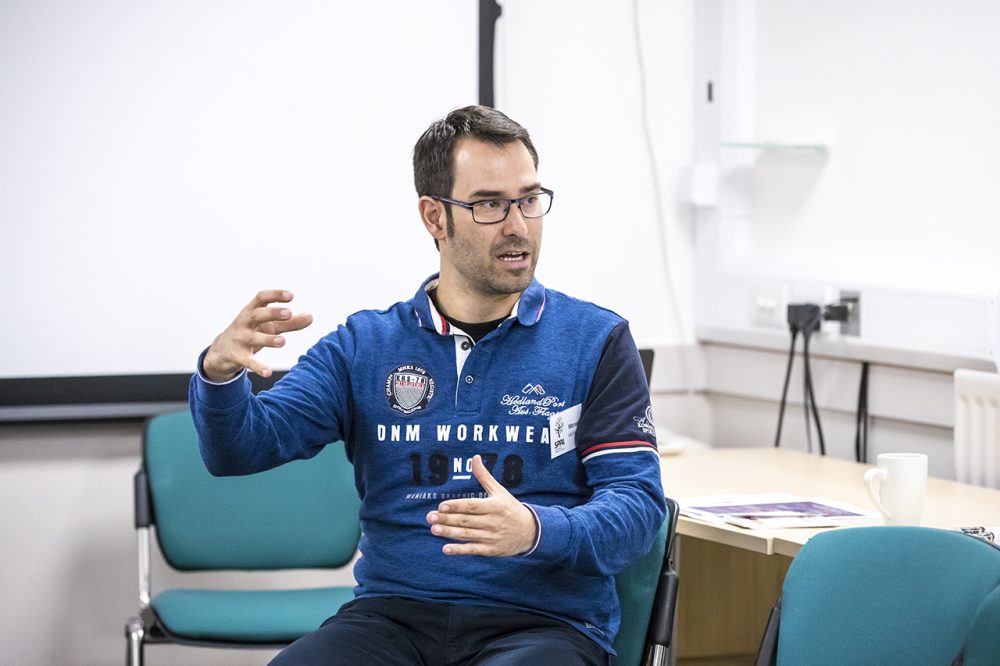
Approximately 15 of us gathered together to explore social pedagogy qualifications, particularly the experience of the newly launched, Ofqual regulated, Crossfields Institute Level 3 Social Pedagogy Diploma.
We heard from supported lodgings carer, Stuart Lindsell about his experience to date with the diploma, his learning being taken to greater depth, shared support amongst the group of learners in Surrey and the variety of assessment methods which provides a range of ways for people to demonstrate their learning.
We touched on the Standards for Education and Training in Social Pedagogy, considered how the newly Ofqual regulated Crossfields Institute Level 5 qualification will create a pathway for graduates to pursue further learning at degree level.
We also discussed the integration of social pedagogy in courses for other disciplines, such as youth work and social work and the role qualifications can play in the systemic development of social pedagogy in organisations.
Graduates of the Level 3 and Level 5 diploma courses will have the title Social Pedagogy Practitioner. Anyone interested in further information can contact Gulsh Khatun at g.khatun@ucl.ac.uk
| Developing a Project Bank for SPPA |
|
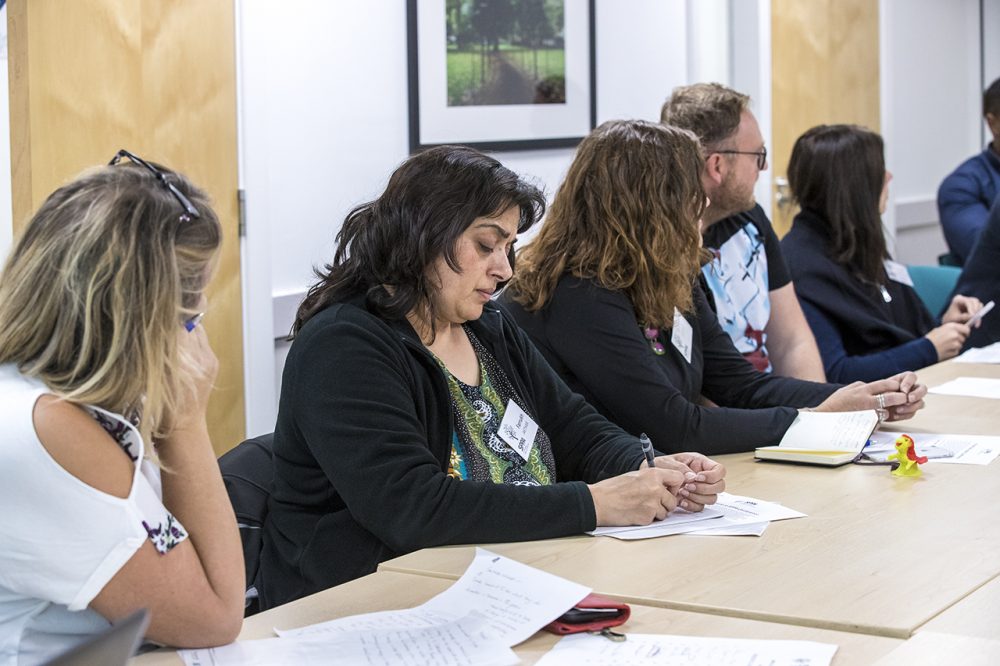
The idea behind a project bank is to give practical expression to SPPA as a learning community. The SPPA website has a space for members to upload information about their projects or lines of enquiry and inspire or seek help from others. The project bank workshop discussed this idea as a practical and a political exercise, as generating practical evidence within a social pedagogic frame will both help to build the evidence base from practice upwards, and confront established ideas about the way to do things. Workshop members exchanged current projects and considered what else we needed to know. One idea was to research what social pedagogical documentation, as described by Peter Moss in relation to practice in Reggio Emilia early childhood centres, might look like in other settings and in the UK. All workshop members were urged to complete a template about projects and lodge them with SPPA. Attendees were joined to an email list so they may stay in touch with each other.
If you would like more information on the SPPA project bank, visit the Project Bank page
| The relational universe of a child in care |
|
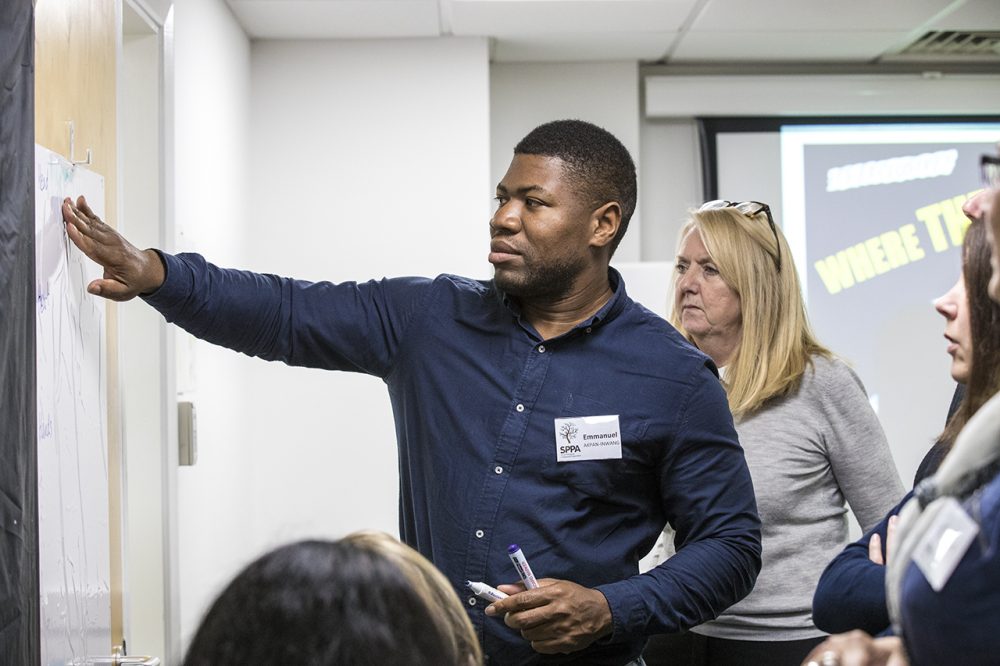
We started with an initial activity which demonstrated the interdependence of the group on each other to achieve a task, as we all are in our lives. Followed by a short reflection about how this was/wasn’t achieved.
We then explored a participants personal RU and then moved on to that of a person (either fictitious or real) that they identified by placing other ‘planets’ in a universe around that person.
We had small group reflections on these questions around relationships:
Head: How and who decides that a person is in that universe?
Heart: What values underpin relationships for you?
Hands: What needs to happen to develop and support relationships?
External factors (meteorites) that would have an impact on the RU were then introduced.
This was a very short introduction to what becomes a fascinating exploration of the RU around a child in care or an older adult or someone with a disability (or anyone!) that can be used to identify supportive and other relationships and initiate a process where that person can be supported to develop sustainable relationships around them.
| Social Pedagogy in Refugee Camps |
|
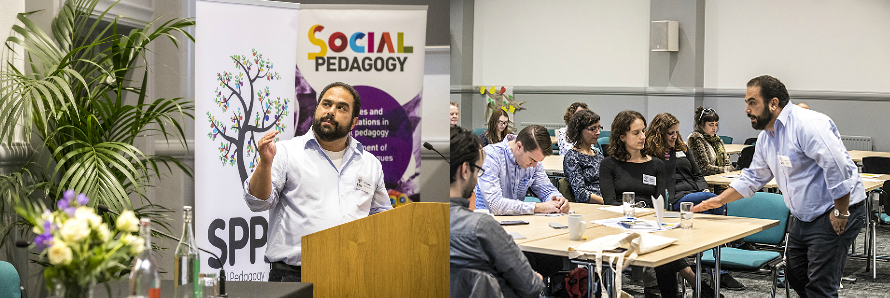
During the workshop Vasileios Tiliakos presented how Social Pedagogy influences a model of alternative care in refugee camps for unaccompanied children, children who entered Greece without any legal carer.
Staff, trained in the principles of Social Pedagogy, implement a 3-step intervention model to help and support refugee children to overcome their difficulties and prepare them for their new life. In summary, the intervention model focuses on transforming the children from passive receivers of help to active decision-makers of the programme and their lives. Ways of contributing to our model were explored in the group.
If you want more specific information on the programme or if you are interested in exploring ways of interaction, please contact Vasileios directly at Vasileios.tiliakos@rescue.org.
| Special Interest Group: Creativity |
|
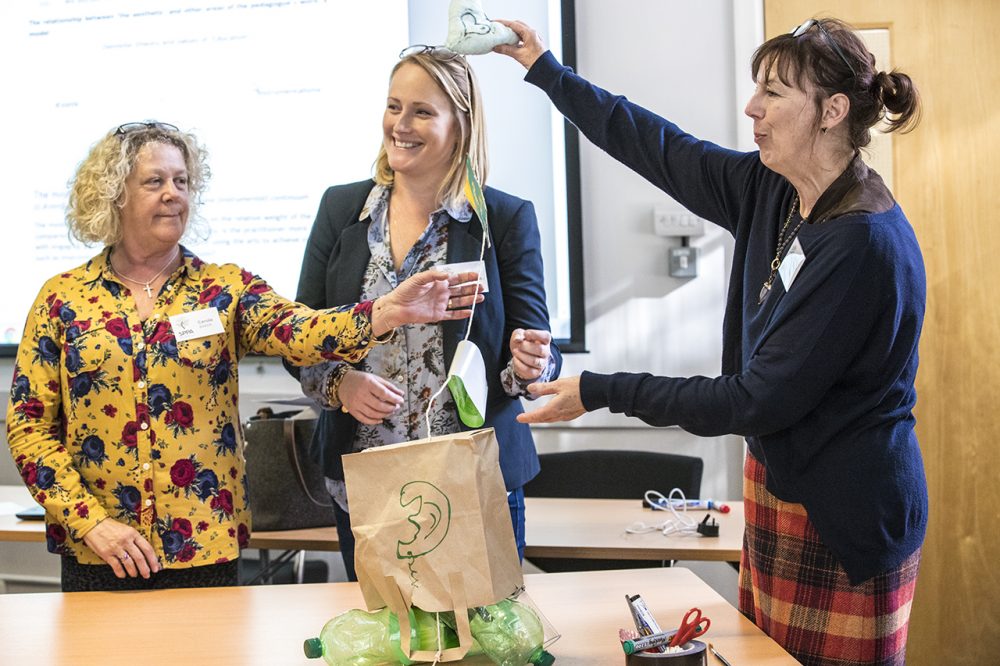
This workshop linked creativity and arts practice with social pedagogy and explored their productive links. It covered:
- Background of the Learning Framework for Artist Pedagogy (LFAP)
- Built a ‘Junk Sculpture’, working question: ‘What is the unique experience I bring to my work and the people I work with?’
- Discussed each sculpture, the individuality and characteristics, the process groups went through to create them
- Explained and discussed the ‘Dannelse model (from Chambers/Petrie 2009), linked to LFAP above
- Visualised on the floor with ropes and signs, participants were asked to self-assess within the model, for their own reflection and development.
The workshop was attended by 13 people from a variety of backgrounds including fostering, family. Support, teaching in FE, residential pedagogy and others.
What next? The workshop leaders will join up participants via their email details, and would like to continue further discussion in carrying forward the use of arts and creativity in social pedagogic practice. At the end of the session, participants in the workshop were invited to express an interest to join the Special Interest Group: Creativity within SPPA, this is a standing invitation to anyone who feel they have something to offer.
| Development of a Social Educator Profession in Portugal |
|
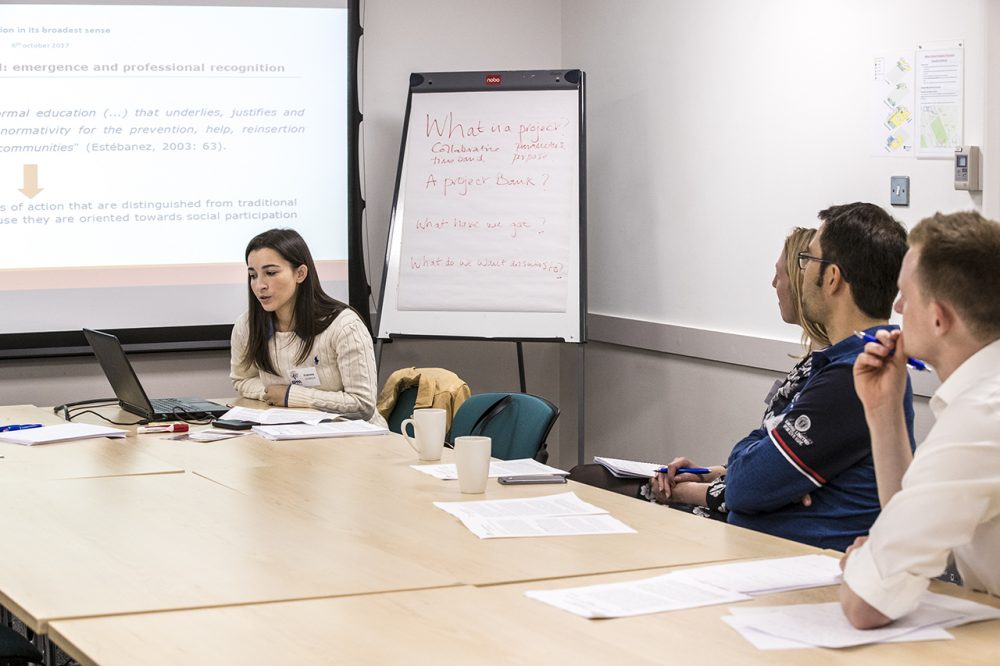
Social Education has recently emerged as a profession in Portugal. This work intends to describe the role these professionals play in developing society and how it finds its theoretical framework in Social Pedagogy. Social Education is a social work imbued with a pedagogical character (educational dimension in society) and educational work carried out in the context of social action (socializing dimension of education). Education constitutes a tool of social participation and socioeducational action and, consequently, of community development. Thus, Social Pedagogy seeks to respond to the potential of society as a factor of social development. Education is not limited only to the school context, extending to all areas of people’s life in all dimensions, as essential scopes of the construction of citizenship. Social Education emerged in Portugal through the awareness that social work needed new educational policies, since the forms of traditional intervention / assistance were already reducing the need for social intervention. Through this new polyvalent profession, new methodologies of social intervention are verified in Portugal.



